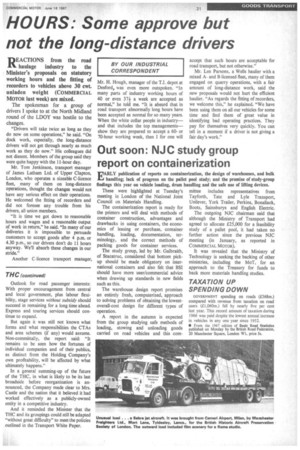HOURS: Some approve but not the long-distance drivers
Page 33

If you've noticed an error in this article please click here to report it so we can fix it.
REACTIONS from the road haulage industry to the Minister's proposals on statutory working hours and the fitting of recorders to vehicles above 30 cwt. unladen weight (COMMERCIAL MOTOR last week) are mixed.
The spokesman for a group of drivers I spoke to at the North Midland round of the LDOY was hostile to the changes.
"Drivers will take twice as long as they do now on some operations," he said. "On dock work, especially, the long-distance drivers will not get through nearly as much work as they do now." His colleagues did not dissent. Members of the group said they were quite happy with the 11-hour day.
Mr. Tom Jenkinson, transport manager of James Latham Ltd. of Upper Clapton, London, who operates a sizeable C-licence fleet, many of them on long-distance operations, thought the changes would not have any serious effect on their operations. He welcomed the fitting of recorders and did not foresee any trouble from his drivers, all union members.
"It is time we got down to reasonable hours and wages and a reasonable output of work in return," he said. "In many of our deliveries it is impossible to persuade customers to accept goods after 4 p.m. or 4.30 p.m., so our drivers don't do 11 hours anyway. We'll absorb these changes in our stride."
Another C-licence transport manager, Mr. H. Hough, manager of the T.I. depot at Desford, was even more outspoken. "In many parts of industry working hours of 40 or even 374 a week are accepted as normal," he told me. "It is absurd that in road transport abnormally long hours have been accepted as normal for so many years. When the white collar people in industry— and that includes the top managements— show they are prepared to accept a 60or 70-hour working week, then I for one will accept that such hours are acceptable for road transport, but not otherwise."
Mr. Len Parsons, a Wells haulier with a mixed Aand B-licensed fleet, many of them engaged on quarry operations, with a fair amount of long-distance work, said the new proposals would not hurt the efficient haulier. "As regards the fitting of recorders, we welcome this," he explained. "We have been using them on all our vehicles for some time and find them of great value in identifying bad operating practices. They pay for themselves very quickly. You can tell in a moment if a driver is not giving a fair day's work."




































































































































